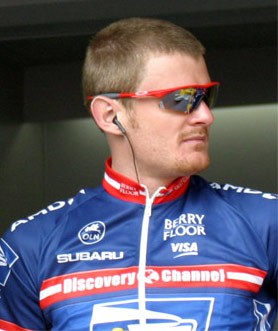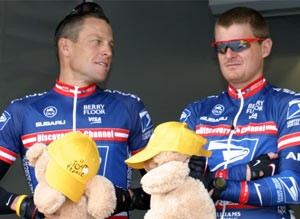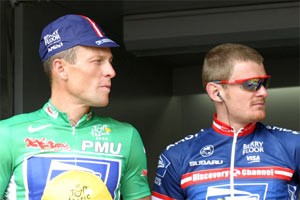Former USPS team-mate and others detail accusations of doping, Landis apologises to public
 The latest big development in the US Postal Service team inquiry occurred last night when Floyd Landis, who sparked off the investigation earlier this year, appeared on ABC’s Nightline programme to further document what he said went on in the team.
The latest big development in the US Postal Service team inquiry occurred last night when Floyd Landis, who sparked off the investigation earlier this year, appeared on ABC’s Nightline programme to further document what he said went on in the team.
Landis reiterated some of the claims he made earlier this year about the squad and about its leader Lance Armstrong, answering a series of questions about what he said happened during his period with the team. While there was nothing particularly new about what he said, it was the first time for him to speak on television and this gave viewers the opportunity to better assess what he was saying, to read his body language, and to determine for themselves whether or not he appeared plausible.
Nightline also included interviews with Betsy Andreu and Emma O’Reilly, two women who previously alleged misconduct on the USPS outfit, while Armstrong’s attorney Tim Herman spoke on behalf of the Texan.
As some may have not had the opportunity to watch the show, VeloNation has documented what was said, publishing transcripts where useful. This is what was featured on the programme.
The Nightline segment began with shots of Landis racing at the Cascade Classic this week, with reporter Neal Karlinzky making the point that riding in a simple t-shirt marked what he termed ‘an epic fall from grace for Landis.
It then cut to the rider in studio, who wasted little time in getting to the crux of what he is alleging. “If I’m taking on Lance Armstrong, than that should be evidence enough that there’s a problem with the system because I’m saying a bunch of people did it,” he said. “Look, at some point, people have to tell their kids that Santa Claus isn’t real. I hate to be the guy to do it, but it’s just not real.”
He was asked directly if he was saying Armstrong was a fraud.
“Well, that depends on what your definition of fraud is,” he answered. “Look, if he didn’t win the Tour, someone else that was doped would have won the Tour…in every single one of those Tours.”
The programme continued with shots of Armstrong’s Tour victories, then talked about his battle against cancer, what the programme referred to as his ‘fairy-tale’ comeback to win the Tour, his ‘golden boy’ image, the millions he earned and the statement that he has movie stars and world leaders on speed dial.
It then said that during the programme, Landis would present a less glamorous image of the rider. The following exchange took place:
Q: When was the first time you were handed something?
Landis: Lance Armstrong handed me some testosterone patches. It’s just a little patch you put on your skin. It’s not like – I mean, a blood transfusion is a bit more dramatic. It’s a large needle, and it’s blood. But a patch deliverers , testosterone, transdermal patch…it is not anything dramatic.
Q: Did you see Lance Armstrong receiving transfusions?
Landis: Yes.
Q: More than once?
Landis: Yes. Multiple times.
Q: Did you see Lance Armstrong using other performance-enhancing drugs?
Landis: At times, yes. At different training camps.
Q: Like what?
Landis: Well, there’s not a whole lot, like I said, that helps. There’s EPO you can use, and you can use small amounts during the Tour de France if you need to monitor certain parameters that are tested for, that change because of blood trans fusions.
Q: You saw him using EPO?
Landis: I have, yeah. I also received some from him.
Rather than go into entire detail of every single time I’ve seen it – yes, I saw Lance Armstrong using drugs.
Q: I have to say, Floyd, you stay it in a matter of fact way, and yet this is a man, Lance Armstrong, that’s denied up and down for a decade that he’s on anything but his bike, [on] anything but just hard work…
Landis: I denied it, as well.
Q: You’re saying Lance Armstrong is a liar?
Landis: Yes, I suppose if that’s the question, yes.
The programme then cut to Armstrong’s attorney, Tim Herman, who vigorously denied the claims. “Landis is a confessed perjurer, and he is a liar,” he said. “Lance is the most tested athlete, amateur or professional, in the history of sport. We don’t know exactly the number, but we think it is around 300 separate tests that he’s undergone. And he has never had a positive test. Those tests have occurred in Europe, in the United States. He is walking down the street in New York City and they snatch him and take him in for tests. He is leaving the house for the birth of his twin daughters and they take him for a test. As we say in Texas, the proof’s in the pudding. Look at the pudding – there’s 300 tests and there’s not a single positive.”
Cue shots of Armstrong and Landis training and racing together, and a voiceover pointing out that they used to be team-mates and that the latter was his heir apparent. The programme featured shots of Landis winning the 2006 Tour de France, then outlined his positive test and denials that he had done anything wrong. It also included an old shot of Armstrong, appearing to defend Landis.
“My suggestion to Floyd would be to, if you believe you’re innocent, you stand up and fight for it,” he said.
The point was then made that Landis has many doubters, but that federal agents who investigated steroid use in baseball were looking into the claims, issuing subpoenas to riders and team sponsors, and reportedly going after US Postal Service team. Cue another studio shot of Landis being questioned:
Q: You do realize you have serious credibility issues?
Landis: I think that would be an understatement.
Q: You’re admitted liar and cheat…
Landis: What is a person supposed to do when they make a wrong decision? Are you committed to that path for good? Are you — once you tell a lie, are you committed to tell that lie forever?
Q: Lance says you have no credibility.
Landis: You just said I have no credibility.
Denials:
 The programme showed another clip of Armstrong, this time at the Tour of California this spring. “You have somebody who has written a book with a completely different version,” he is shown as saying about his prime accuser. “You have somebody who took people’s money for their defence…some would say a million dollars with a completely different version. He said he has no proof. It’s his word versus ours.”
The programme showed another clip of Armstrong, this time at the Tour of California this spring. “You have somebody who has written a book with a completely different version,” he is shown as saying about his prime accuser. “You have somebody who took people’s money for their defence…some would say a million dollars with a completely different version. He said he has no proof. It’s his word versus ours.”
“Lance has not been subpoenaed in this investigation that’s going, on. Nor has he been contacted in any way. Nor have I,” said Herman.
“As Lance has said, he’s going to cooperate with any legitimate, fair, investigation, but not participate in a witch hunt. And so far, this has all the markings of a witch hunt.”
Nightline continued by talking about the emails Landis sent to officials earlier this year, admitting his own cheating and accusing Armstrong and others of using banned substances. It asked Landis about the specifics of the claims that doping was carried out in team hotels and on the US Postal bus.
Q: You talk about the team pulling off in the team bus on the side of the road?
Landis: Yeah, that incident was in 2004.
Q: What exactly went on?
Landis: Well, somebody showed up with blood and we all, received a — somewhere around, between 300 and 500 milliliters of blood…whatever those blood bag sizes were.
Q: You’re in the bus. Your teammates are there….
Landis: Again, it seems shocking to you, but at this point, it had become the norm, that the world didn’t know about. And what was going on was obviously, if it had been found out, would have been a real disaster.
The voiceover pointed out that Herman claimed that Armstrong hardly ever travelled on the team bus, but Landis insisted that the transfusions happened as documented.
“It was just a matter of a disguise as to what was going on, I think,” he said, explaining why the procedure was done on the move at that point in time. “The team had become paranoid, at least the doctors, Johan and whoever was managing the logistics of the entire thing. They had become paranoid that the police or somebody was watching hotel rooms and so we decided to do it in the bus.”
That was followed by a denial of sorts by former USPS manager Johan Bruyneel, who didn’t address the specific allegations but rather blasted Landis.
“I have always known Floyd as an angry person, as somebody who is basically angry with the world,” he said. “Now he’s — I think he’s just — to me, it sounds like he just wants to drag down people who are still there.”
Landis continued with details of how he said the hotel transfusions were carried out.
Landis: The blood would be taped on the wall or hung up at a certain level above your head so gravity causes it to run into your veins. Then you leave. It’s not complex. It’s your own blood and there’s no risk of adverse reactions, assuming it was stored properly.
Q: How long would it take? [Do] you have a nurse helping? How many people in the room?
Landis: There was always a doctor, or two doctors.
Q: And how long would you have to lie there?
Landis: It doesn’t take too long. 20 Minutes at the most.
The 34 year old said that he didn’t beat himself up over the decision to start. “I considered it for a long time,” he said. “Once I understood the magnitude of the drug use among the peloton, I justified it in my own mind that there’s one set of rules that the world knows about, and then there’s another set that the peloton lives by.”
Another person who used to work on the team is Irishwoman Emma O’Reilly, who was employed for several seasons as a soigneur. She was previously quoted extensively in the LA Confidentiel and From Lance to Landis books, saying then that Armstrong told her that he was going ‘to do what everybody else does,’ in correcting a low red blood cell count [taken to mean EPO shots]. She also said in those books that she provided makeup to Armstrong to cover syringe marks on his shoulders back in 1999, so that photographers at the Tour medical assessment wouldn’t suspect anything. (EPO was traditionally administered via injections into the shoulders).
However O’Reilly’s brief appearance on the programme didn’t include those details:
Q: Any stage, did you see Lance Armstrong doing anything suspicious like taking drugs or injecting himself?
O’Reilly: No, no.
Q: Reporter: You saw nothing?
O’Reilly: No.
Nightline pointed out that many of the riders Armstrong beat between 1999 and 2005 either tested positive or admitted using banned substances. It also mentioned former team-mates Tyler Hamilton and Frankie Andreu as having admitted to using drugs.
The latter was mentioned in greater depth when the subject of a claimed medical room confession came up. His wife Betsy Andreu detailed the basis for their 2005 testimony that the rider had admitted using a number of banned products prior to being diagnosed with testicular cancer.
“One of the doctors started asking questions, and the one that popped out was, ‘have you ever used any performance enhancing drugs?’,” she said. “And Lance, holding his IV, looking down, rattled off EPO, testosterone, steroids, growth hormone, cortisone…that was my introduction to performance enhancing drugs in the sport of cycling.”
A reaction was show to those claims, with Herman denying. “I don’t know if they are misunderstood or are making the whole thing up, but it did not happen,” he said.
Andreu said that there was a price to pay after they spoke about 1996. “Lance was just too powerful. And if you go up against him, you’re not going to work in cycling. People didn’t want to hire Frankie, because we weren’t going to lie. We were going to tell the truth, if we were — if we had to. It’s not like I went out and called ABC and said, I’ve got something to tell you. We were subpoenaed by Michigan court order.”
Nightline spoke about the payments given by Armstrong to the UCI, with a reported $25,000 being given in 2002 and another of $100,000 paid later. It said that the UCI refused to answer ABC’s questions, but quoted Andreu on what she felt should be done.
“Cycling can be cleaned up,” she said. “You have to start with the UCI, the governing body. What Americans don’t realize is when Lance is giving the donations, it’s kind of like Barry Bonds giving money to Bud Selig.”
 Landis finished up his contribution by explaining why he had come forward, and also by apologising for lying in the past:
Landis finished up his contribution by explaining why he had come forward, and also by apologising for lying in the past:
Landis: It is about the truth. It is about me feeling better for having misled the public. And for that I would like to say sorry. I haven’t had a chance to do so, apart from newspaper and print, and I would like to take that opportunity today to just say that I’m sorry for having lied.
I’m glad I don’t have to lie [now]. It was hard to do interviews where I was lying. I’ll feel better when I’m done talking to you.
Q: Are you scared? You’ve lost a lot.
Landis: I don’t get scared very easily anymore. I’m ready to face whatever I have to face.
The programme wound things up with a quote from Herman, who complained about the timing of the accusations. “It’s been cruel. It’s been way over the top. And essentially it has ruined his last Tour,” he said.